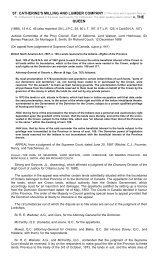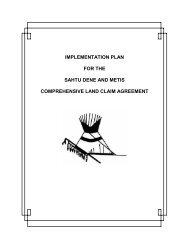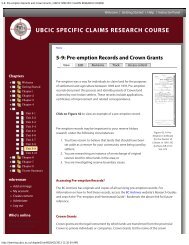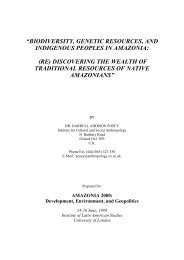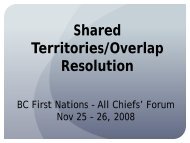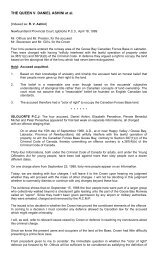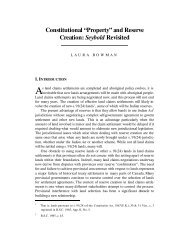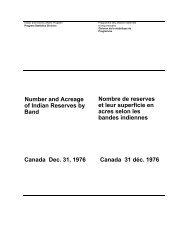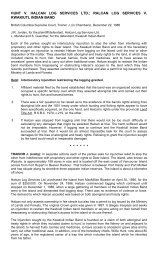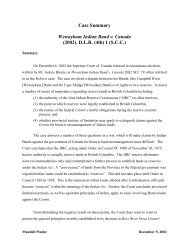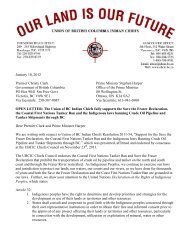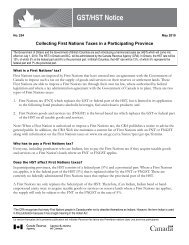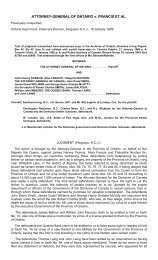ATTORNEY GENERAL for ONTARIO (Respondent) v. BEAR ...
ATTORNEY GENERAL for ONTARIO (Respondent) v. BEAR ...
ATTORNEY GENERAL for ONTARIO (Respondent) v. BEAR ...
You also want an ePaper? Increase the reach of your titles
YUMPU automatically turns print PDFs into web optimized ePapers that Google loves.
General asserted a claim to an unencumbered title to the Land Claim Area. The appellants claimthat the title to the Land Claim Area is burdened by aboriginal rights possessed by the TemagamiIndian Band. The learned trial judge denied the appellants' claim and rested his judgment on anumber of alternative grounds. The appellants take issue with all of his conclusions and ask thatthe judgment be reversed.It should be made plain what is in issue in this appeal. The subject matter of the dispute is the titleto land. The province takes the position that its ownership of the land in question is unencumberedby any aboriginal rights of the appellants. The appellants, of course, argue the contrary. What isnot at stake in this appeal is the right of the appellants to claim compensation or to claim any otherbenefit that may accrue to them as an unfulfilled obligation under the Robinson-Huron Treaty.II.THE ISSUESA. Problems at TrialCounsel <strong>for</strong> the appellants filed a volume of factum and written argument entitled "Problems atTrial." The first paragraph sets <strong>for</strong>th the substance of the complaint.The following is a compilation of miscellaneous incidents during trial, evidentiary rulings,remarks by Steele J. both during the trial and in his reasons <strong>for</strong> Judgment, which in thesubmission of the Appellants reflect a hostility of mind on the part of the trier of fact towardthe Defendants at trial sufficient to call into question whether Steele J. impartially andjudicially weighted the evidence be<strong>for</strong>e him in reaching his findings of facts and credibility.The allegation is astonishing in light of the comments that follow in the factum about counsel at trial(not either of the counsel who appeared on the appeal). It states that he was inexperienced,presented the evidence in excessive detail, cross-examined his own witnesses, engaged in lengthylines of questioning which were of dubious relevance, and attempted to argue the case whileintroducing evidence. At the close of evidence, he filed a written argument which dealt not at allwith the evidence be<strong>for</strong>e the trial judge but was a treatise on aboriginal rights prepared prior to thetrial. Counsel on appeal stated that trial counsel's personal involvement in his clients' case causedhim to make certain inappropriate and disrespectful remarks about the court and the judicialsystem.Notwithstanding this, it is submitted in this court that friction developed between counsel and thetrial judge and thatThe understandable irritation shown by Steele J. towards counsel <strong>for</strong> the defendants isevidence of possible bias, and raises a reasonable apprehension that Steele J. may nothave considered the merits of the defendants' case as impartially as he might otherwisehave done.The trial was of exceptional length and complexity. There were 120 sitting days and more than3,000 exhibits were filed. On the appeal, which lasted 14 hearing days, appellants' counsel argued<strong>for</strong> 8 days, including reply. The respondent, the Attorney-General <strong>for</strong> Ontario, argued <strong>for</strong> the bestpart of 4 days. The rest of the time was taken up by the interveners.The case on appeal was argued largely on the facts by appellants' counsel. The appellants filedwith the court 7 volumes of factum and written argument, the respondent filed 5 volumes and thethree interveners filed 1 volume each. The court was referred to other material which was filed inaddition and to substantial passages from the evidence and exhibits. In particular, with referenceto the criticism of the trial judge, we were referred separately to all his so-called interjections, all hisrulings on evidence and to all his findings in the judgment to which exception was taken on thegrounds of possible bias.We have made a careful review of all this material and are of the opinion that the trial judgeshowed exceptional courtesy to and patience with a very inexperienced counsel who insisted onpresenting masses of evidence, much of which was of marginal relevance. The trial judge bentover backwards to assist counsel and was well aware of the evidentiary problems facing theTemagami Band in attempting to reconstruct an ancestral history that it alleged went back prior to1763. We can only say that having conducted this review, we have no hesitation in holding that thecomplaints as to the trial judge's conduct are frivolous and not worthy of further comment.B. Findings of Fact



